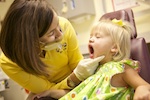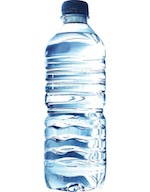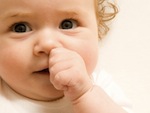We are the first to admit that visiting your child’s dentist can be a confusing experience for parents, especially when we may only see you twice a year. There are a lot of rumors and sometimes contradictory information out there and we get a lot of the same questions over and over.
We love our parents for caring so much about their kids’ health and thought it might be helpful to post some information on the top 10 myths that we often hear about children’s teeth:
1. Baby teeth aren’t important. They are just going to fall out anyway!

Yes, the tooth fairy will eventually see all 20 of your child’s baby teeth – but before then, they serve many important functions in your child’s development. Baby teeth are natural space maintainers for the permanent teeth. If your child loses a baby tooth too early, this could cause crowding of his/her permanent teeth. The health of your child’s baby teeth can also affect the health of their adult teeth. If you leave dental decay in a baby tooth, it could eventually cause your child pain, abscess, swelling, affect the adult tooth developing under the baby tooth, and the infection could even spread to other parts of the child’s body.
2. My child has cavities because he has soft teeth.
There is no such thing as having “soft teeth.” In fact, enamel (the outer surface of the tooth) is the hardest substance in the body. There are many factors that cause dental decay so it is often difficult to pinpoint the exact cause. We do know that there are three things required to cause tooth decay: bacteria, a diet for the bacteria (sugar!), and a susceptible host (the tooth).
3. My child can brush her own teeth.

Although it may appear that your child can brush her own teeth, most likely, she is not getting all the “hard to reach” places. In fact, children do not develop the manual dexterity needed to brush all their teeth on their own until they can write in cursive handwriting. Until then, we recommend allowing your child to brush followed by a thorough brushing by the parent.
4. I don’t need to take my child to the dentist until she starts school.

There are many reasons why finding a dental home for your child is beneficial to your family. It’s important of course, to have the dentist count and check all their teeth for cavities. It’s also important for the dentist to establish a relationship with your child to help allay any fears of the dentist, to help establish a preventive plan to help fight tooth decay, and to have a dentist to contact in case of a dental emergency.
5. My child won’t drink plain water. Flavored water and “all natural” juices won’t cause tooth decay.
Any drink besides water is most likely going to contain sugar – which ultimately feeds the cavity-causing bacteria in your child’s mouth. The American Academy of Pediatrics recommends that children under 6 should limit their juice intake to 4-6 ounces of juice a day (one cup). It is also recommended that your child drink the juice during a meal and if they are thirsty in between meals, to drink water. Water is healthy for your body, healthy for your teeth, and best of all, it’s FREE!

6. It’s okay to soothe your child to sleep by putting them to bed with a bottle of milk.
Milk also has sugar which can ultimately cause tooth decay. Like juice, milk is okay to drink but in limited quantities. It is also best to drink milk at mealtime only so your child’s teeth don’t have prolonged exposure to the sugar.
7. Fluoride isn’t safe to swallow and may harm my child.
A lot of research has been conducted regarding the safety of fluoride use. Scientific evidence indicates that, as with other nutrients, fluoride is safe and effective when used and consumed properly. In fact, fluoride has been proven to be one of the most effective ways to prevent tooth decay.
8. Bottled water is just as good for your teeth as tap water.

Tap water contains an important ingredient (fluoride) which has proven to strengthen the enamel of your teeth. The American Dental Association has endorsed fluoridation of community water supplies as safe and effective for preventing tooth decay for over 40 years. Most bottled water does NOT contain fluoride which means your child is missing out on this great vitamin for their teeth.
9. My child doesn’t need to floss until his adult teeth are in.
Once all 20 baby teeth have erupted, you may notice that your child either has some spaces in between some (or all) of his baby teeth, or you may notice that the baby teeth are touching. Having space between baby teeth is common and beneficial as it allows room for the larger adult teeth to erupt. When baby teeth are touching, cavities can form in between the teeth on the surfaces that the tooth brush will not reach. Flossing in between your child’s baby teeth can prevent cavities from forming in these areas. The earlier you introduce your child to floss, the more comfortable they will feel with adding this to their routine.
10. I can’t get my child to stop sucking his fingers/thumb!

Parents of children who have a finger habit can drive themselves crazy trying many methods to convince their child to stop the habit. If your child has a finger habit, the goal is always to have them stop the habit prior to starting Kindergarten. Your child’s front baby teeth will be replaced with adult teeth around this time. When the front adult teeth are erupting, you want to avoid any forces placed on these teeth so that they can erupt in their natural positions. Pediatric dentists have many ideas to help parents fight the finger-sucking battle – so make sure to ask at your next check-up visit!
Download and share this article!
 Download the PDF to share with a friend.
Download the PDF to share with a friend.

